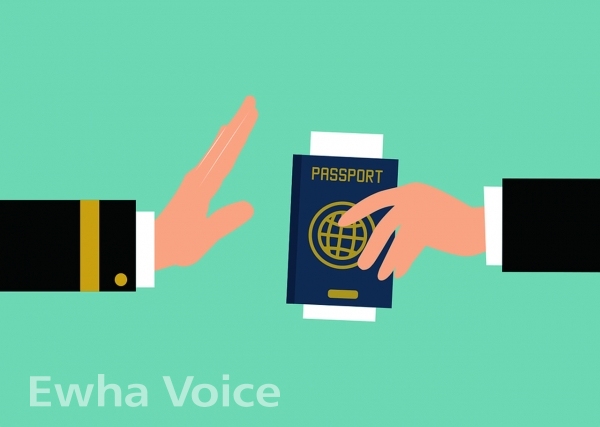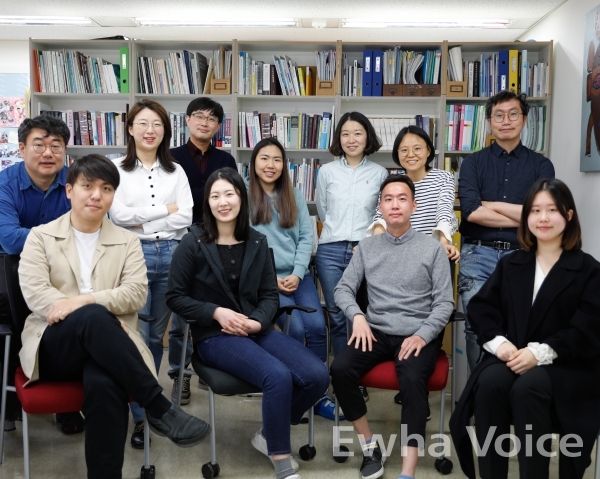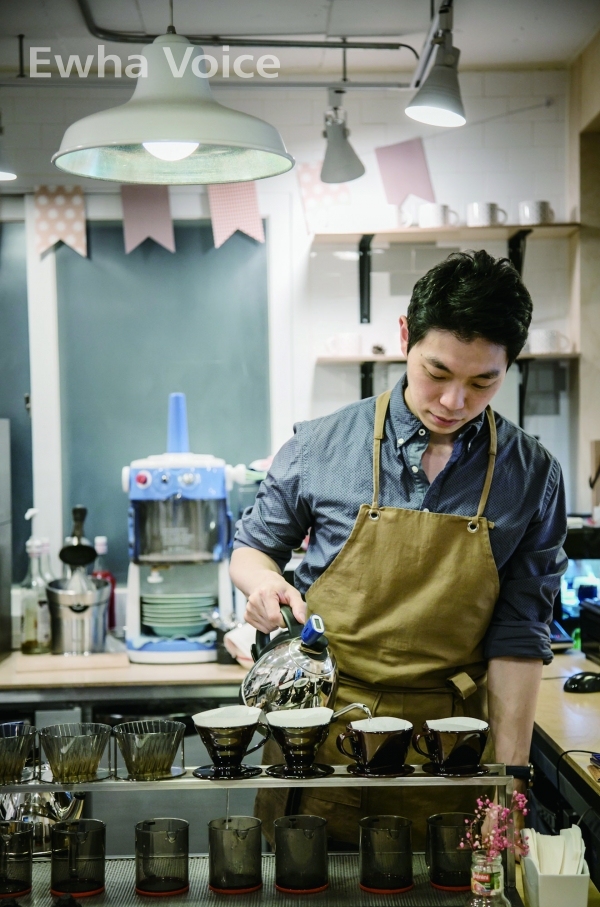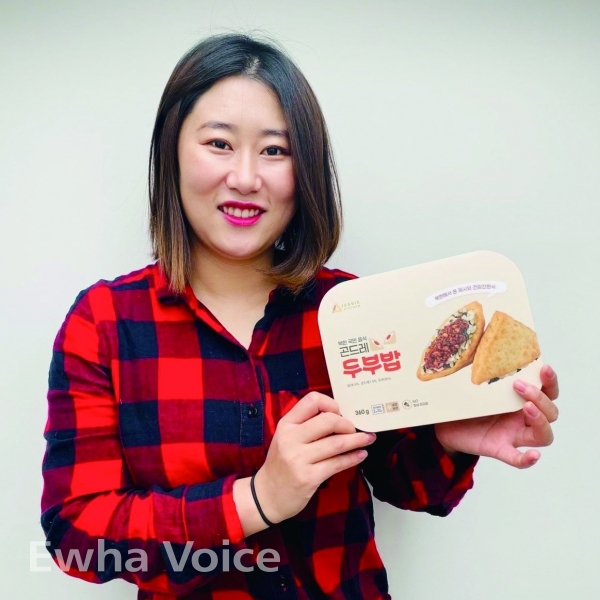By Ahn Hye-jun, Lee Hyun-jin, Jeong Da-eun, Shin Hye-won
According to the United Nations High Commissioner for Refugees, South Korea has recognized and admitted 3,575 refugees into the country as of Dec. 31, 2021. In 2013, South Korea became the first Asian country to pass the Refugee Act and its Presidential Decree and Enforcement Regulation, putting them into effect in the nation. However, its recent refugee approval rate placed a staggering 18th out of 19 G20 countries. Ewha Voice interviewed three individuals who have either sought out methods to protect the human rights of refugees or experienced life as one to share their insights on the refugee issue in South Korea.
Stark reality of refugees

According to the United Nations High Commissioner for Refugees (UNHCR), there are about 84 million forcibly displaced people in the world with 26.6 million of them being refugees. Refugees are people who have crossed international borders seeking safety in another country away from war or violence. Many refer to the cases of refugees as refugee crises, with some major countries of origin for refugees at present being Syria, Afghanistan, South Sudan, and Myanmar. According to Amnesty International, 85% of refugees are hosted in developing regions such as Jordan, Uganda, Colombia, and Bangladesh.
South Korea joined the Convention Relating to the Status of Refugees in 1992 for the purpose of recognizing international migrants who are in danger of persecution for differences in race, religion, nationality, and political opinion as refugees.
In addition, the Refugee Act of Korea was enforced in July 2013 and a pilot resettlement program was further launched for refugees in December 2015. Despite the aforementioned efforts, Korea is still behind in protecting refugees, with its acceptance rate a mere 1.3 percent.
However, some point out that the situation in South Korea is different from other countries. South Korea accepts North Korean defectors with refugee status regardless of the Convention Relating to the Status of Refugees. This is because refugees originally refer to foreigners or stateless people but North Korean defectors are treated as Koreans under the North Korean Refugees Protection and Settlement Support Act. Therefore, they can be recognized even though they do not satisfy the criteria for refugee status and are excluded from refugee-related statistics of Korea.
Moreover, geographical distance from refugee crisis areas should be taken into consideration. Regions where refugee crises mainly occur are mostly in Latin America and the Middle Eastern and Northern parts of Africa. Due to these geographical characteristics, refugees from Latin America mostly head to the United States or Canada, while those from Africa head to Europe. The fact that countries closest to the areas of refugee crisis usually recognize a large number of refugees further explains the low recognition rate of refugees in East Asian countries, such as Korea, China, and Japan.
Legal obligation to assist refugees

Since its foundation in 2011, Advocates for Public Interest Law (APIL), a non-governmental and non-profit public interest lawyers' organization, has been protecting the human rights of refugees through litigation, legal education, and international solidarity movements in cooperation with other human rights organizations.
As a lawyer and current head of APIL, Sejin Kim has fought countless court cases for refugees. Cases dealing with the status recognition of refugees can be excruciatingly long, with some taking up to eight years. However, each case is worth it especially when she wins and gets to witness her clients living decent lives.
She recalled a time when she visited a Nigerian couple's house after she helped them obtain refugee status. The wife had been pregnant with a child when she first met them. Looking at the child excited to go to preschool, Kim was overwhelmed by an inexplicable feeling of happiness.
Kim felt that same emotion when she helped file a lawsuit for a Chinese refugee who had assisted North Korean refugees in escaping to China and South Korea. The refugee had applied for refugee status after being criminally prosecuted for helping out North Koreans in China. Although the refugee was originally denied entry, Kim won the case after three to four long years of legal proceedings.
Despite continuous efforts, there are still thousands of individuals who seek refugee status but are denied entry. The situation is not getting any better, with pejorative perceptions prevailing against refugees in South Korea.
“When someone meets a person from another country, it is natural to feel curious about that person and simultaneously feel somewhat scared,” Kim said. “I believe politics is the most influential factor that turns that ambivalent feeling towards refugees into fear.”
According to Kim, there were not that many citizens who knew about refugees in South Korea up until 2013. In September 2015, the famous picture of Alan Kurdi, who drowned in the Mediterranean Sea at the age of two, drew local and international attention to the refugee crisis. Apprehension about refugees ignited two months later in South Korea with the spread of reports that a refugee was a possible suspect in the November 2015 Paris attacks. Although these claims were later discovered to be fake news, many have mistakenly equated refugees with terrorists since then.
In response to opponents of refugee admissions in South Korea, Kim enumerated two major reasons for the need to support refugees. Under international law, South Korea already has a legal obligation to protect the human rights of refugees. Moreover, from a legal and political perspective, South Korea must abide by international law and accept refugees in order to elevate South Korea's status within the global community.
With this in mind, the government cannot suddenly withdraw from the Refugee Act and Refugee Convention. As long as South Korea has accepted refugee admission, she believes it is only reasonable for the nation to search for more unified ways to integrate refugees into the country.
South Korea has also received an immense amount of aid from the United Nations Korean Reconstruction Agency (UNKRA), one of the seminal found bodies for future refugee assistance branches. Since South Korea has made significant economic growth with the help of UNKRA, the country should return that grant to be used by refugees who are in dire need.
Although there is no critical issue with the legal refugee status determination procedure, Kim recognizes improvements need to be made in the management of application procedures. There are instances in which those who have applied for refugee status are denied entry to the country at ports of entry. Denial of entry is only possible under the circumstance when an individual has been proven with evidence not to be a refugee. However, the ports of entry frequently make up ad hoc, unjustified reasons to reject refugees.
“Our refugee approval rate is low because immigration offices often view refugees as people who need to be taken under control,” Kim said. “We need to open up our minds and look at refugees from a humanitarian perspective.”
Employment conditions for refugees also need substantial enhancement. For one thing, job options are limited. Refugees who were once doctors and scientists can no longer continue in these professions. Their employment options are usually limited to factory work and manual labor. Most of the time, however, refugees face unemployment. This is in part due to xenophobic attitudes, but the pandemic has also exacerbated the situation as a great number of formerly working refugees have been removed from jobs without warning.
Kim revealed that APIL continues to make great efforts to assist refugees. Currently, APIL deals with cases related to the refugee status of Egyptian political exiles, Iranian converts to Christianity, and Syrians and Yemenis fleeing wars in their countries. The organization has also been actively seeking ways to support and protect Afghans who have been admitted to South Korea as “persons of special merit.”
“Refugees are not just people struggling with their lives,” Kim said. “They are courageous pioneers, working relentlessly to obtain freedom. APIL will do our best until the day refugees do not need our help.”
A business growing with refugees

Naeil Coffee is a brand made to train refugees living in Korea as baristas and to dispel prejudice against these people. Mun Junsuk, the CEO of Naeil Coffee, shared his story behind the brand with Ewha Voice and even introduced his new brand Equal Table, which aims to solve the carbon emission problem caused by coffee with the help of refugees.
Mun decided to make a brand of his own after participating in volunteer activities helping refugees for five years since 2009. At first, Mun volunteered to help refugees adapt to Korean society. However, as he became close friends with the refugees, he found out that they were having hardships finding employment and were facing difficulties in making a living despite their great energy and effort.
Mun explains there were four reasons behind refugees’ unemployment. First, many refugees find it difficult to communicate in Korean as there is neither opportunity nor environment for them to learn Korean. Second, Korea is one of the lowest countries among the OECD in refugee recognition. To be specific, about 98% of the refugee applicants are not recognized as refugees, which leads to many restrictions when getting a job. Third, domestic business owners are unfamiliar with hiring refugees, who do not have prior references to consult. Last but not least, various prejudices against refugees are a factor that makes it difficult for them to get a job.
To mitigate these problems, Mun came up with his own cafe, Naeil Coffee. Mun explains that Naeil Coffee is a vocational school and at the same time an ordinary cafe. For guests, it is a cafe that sells African specialty coffee made by African baristas rather than a refugee vocational school. Internally, however, it is a place where refugees could earn employment references.
Delving into the cafe, Mun trains each of the refugees for a year so that they become experts. At the same time, Korean language teachers teach Korean to the refugees individually so that they could develop their fluency to the extent that they have no difficulty working at the cafe. After the refugees work for a year, they graduate from the school and get a job elsewhere based on their experience at Naeil Coffee. Mun has produced a total of twelve baristas through the cafe.
Apart from the refugees, customers also learn a lot through the cafe. Many customers have had a rare opportunity to meet refugees and talk directly to them, which has helped resolve their prejudices against them. The refugees have also dispelled their own prejudices about Korea and better understand Korean culture.
Looking back at his time being a CEO at Naeil Coffee, Mun shared that he did have hard times due to the prejudice people had towards the refugees.
“As the word ‘refugee’ itself can give preconceptions, we introduced them as African baristas instead,” Mun said. “Customers were surprised to see foreigners at the counter at first but quickly adapted to the environment as the refugees spoke fluent Korean and made coffee with a unique taste. Later on, many were surprised to learn that the baristas were actually refugees and often said that they were very different from the image and stereotype they had about refugees.”
Running Naeil Coffee was not always easy for Mun. The most difficult moment for him was when the refugees were no longer allowed to work due to institutional problems. It was especially difficult when a refugee was well adjusted to the cafe but had to leave as they could not be recognized as a refugee or had health problems. However, many of the refugees have received recognition while working at the cafe, which pleased Mun the most. He also added that refugees graduating from Naeil Coffee and getting a job elsewhere and becoming friends with customers they met at the cafe were some of the moments that made him the most delighted.
“Those were the moments that satisfied the purposes of Naeil Coffee: self-reliance and resolving prejudice,” he said.
Currently, Mun is working on making another brand of his own, Equal Table. Mun explains that there are many reasons behind the interest in environmental issues, and one of them is the rising number of refugees due to climate change. Coffee, in fact, emits 15 kilogram of carbon dioxide per one kilogram of coffee beans from production to consumption. Mun thought it would be meaningful to solve the environmental problems caused by coffee with refugees. This way, the brand will also be able to solve the unemployment problem of refugees. Mun plans to release the first carbon-saving coffee in Korea this year.
“Although Equal Table will mainly do business with companies, we are also preparing online and storefront contact with customers,” he said.
Refugees from North Korean viewpoint

The situation for North Korean defectors is not so different from that of refugees. This is due to the United Nation’s principle of nonrefoulement, which refers to the prinicple of not forcing refugees or asylum-seekers to return to face persecution in their home country. Like refugees, North Korean defectors are also subject to refugee status, as they call for protection where a risk of human rights persecution and oppression exists if they are repatriated.
Nevertheless, North Korean defectors are currently in the worst situation ever. Statistics collected by the Ministry of Unification show that the number of North Korean defectors entering Korea was more than 1,000 every year but dropped sharply to 63 as of last year. Even so, due to the severe discrimination and hatred they face, they still face grave challenges even after coming to Korea.
Jessie Kim, a North Korean defector who started a food company, Jessie Kitchen, recalled the experience she once had as a refugee while moving around China and Southeast Asian countries on her way to South Korea.
Working to protect human rights while at college after coming to Korea, Kim looked for ways to continue her activities for human rights. She finally came up with the idea of trying cooking, which she liked the most, as a business.
“I thought food is a tool everyone can empathize with, regardless of politics, religion, or race,” Kim said. “So, opening a cooking class first with North Korean-style food that I was most confident in was how I started Jessie Kitchen in the HMR market.”
However, she explained that there was nothing extraordinarily difficult about starting a business as a North Korean defector.
“Starting a business is always clumsy and difficult for everyone,” she said. “Many people who do business with me don’t even know that I am from North Korea.”
With regard to the current status of the defectors in South Korea, Kim revealed that as she already knows what it is like to escape from North Korea and settle in the new environment. She mentioned that even just hearing the word “refugee” grieves her.
“Since the recent war between Russia and Ukraine, I began to reflect deeply on refugees,” Kim said. “As I was once a political refugee when I was in the process of coming to Korea, the memory of that time still breaks my heart.” Additionally, as North Korean defectors are not accepted as legitimate refugees under the South Korean constitution, she feels even worse for them.
According to the constitution of South Korea, North Korean defectors are considered as nationals of South Korea, not immigrants.
Due to this legislation, refugees from North Korea cannot be given the financial support which those who immigrated to South Korea from other countries are eligible to receive.
Furthermore, because of the stereotypes associated with the term “defector,” an amendment calling for the revision of the law was proposed in 2021. The bill aims to reclassify the North Korean defector families as immigrant families so that they can receive the support they deserve.
Kim also added that as the refugees’ circumstances are different from each other, people should adopt various perspectives for understanding them.
“As there are various kinds and conditions of refugees around us, we need to take a broader and diverse perspective on them,” Kim said.
When it comes to her business, Kim is striving to achieve more stable goals, step by step, for the future. Currently, she focuses on preserving endangered Korean foods and traditions.
When asked about her long-term goal, she wishes to launch more products of Jessie Kitchen that can connect the Korean peninsula and introduce them to more people so that even people in the international community could be aware of Korean food someday.

